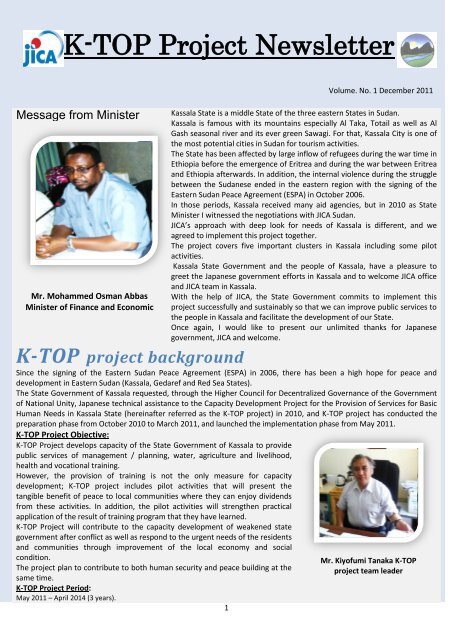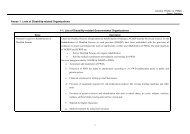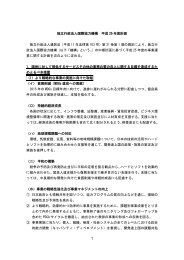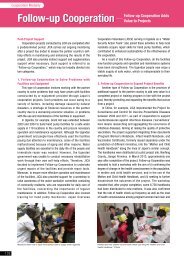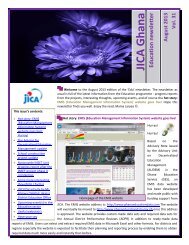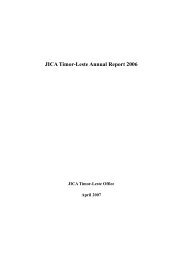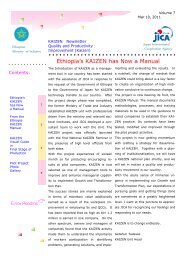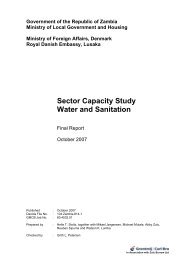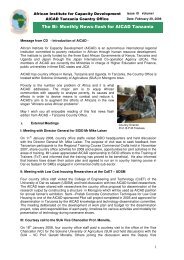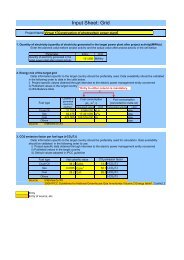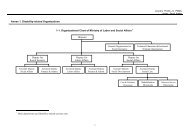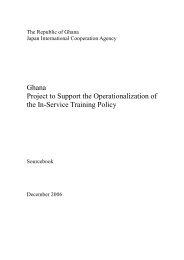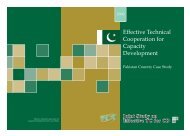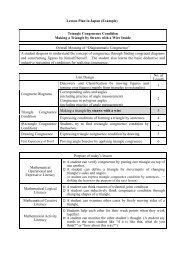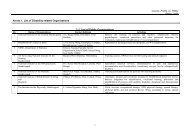K-TOP Project Newsletter
K-TOP Project Newsletter
K-TOP Project Newsletter
You also want an ePaper? Increase the reach of your titles
YUMPU automatically turns print PDFs into web optimized ePapers that Google loves.
K-<strong>TOP</strong> <strong>Project</strong> <strong>Newsletter</strong><br />
Message from Minister<br />
1<br />
Volume. No. 1 December 2011<br />
Kassala State is a middle State of the three eastern States in Sudan.<br />
Kassala is famous with its mountains especially Al Taka, Totail as well as Al<br />
Gash seasonal river and its ever green Sawagi. For that, Kassala City is one of<br />
the most potential cities in Sudan for tourism activities.<br />
The State has been affected by large inflow of refugees during the war time in<br />
Ethiopia before the emergence of Eritrea and during the war between Eritrea<br />
and Ethiopia afterwards. In addition, the internal violence during the struggle<br />
between the Sudanese ended in the eastern region with the signing of the<br />
Eastern Sudan Peace Agreement (ESPA) in October 2006.<br />
In those periods, Kassala received many aid agencies, but in 2010 as State<br />
Minister I witnessed the negotiations with JICA Sudan.<br />
JICA’s approach with deep look for needs of Kassala is different, and we<br />
agreed to implement this project together.<br />
The project covers five important clusters in Kassala including some pilot<br />
activities.<br />
Kassala State Government and the people of Kassala, have a pleasure to<br />
greet the Japanese government efforts in Kassala and to welcome JICA office<br />
and JICA team in Kassala.<br />
Mr. Mohammed Osman Abbas With the help of JICA, the State Government commits to implement this<br />
Minister of Finance and Economic project successfully and sustainably so that we can improve public services to<br />
the people in Kassala and facilitate the development of our State.<br />
Once again, I would like to present our unlimited thanks for Japanese<br />
government, JICA and welcome.<br />
K-<strong>TOP</strong> project background<br />
Since the signing of the Eastern Sudan Peace Agreement (ESPA) in 2006, there has been a high hope for peace and<br />
development in Eastern Sudan (Kassala, Gedaref and Red Sea States).<br />
The State Government of Kassala requested, through the Higher Council for Decentralized Governance of the Government<br />
of National Unity, Japanese technical assistance to the Capacity Development <strong>Project</strong> for the Provision of Services for Basic<br />
Human Needs in Kassala State (hereinafter referred as the K-<strong>TOP</strong> project) in 2010, and K-<strong>TOP</strong> project has conducted the<br />
preparation phase from October 2010 to March 2011, and launched the implementation phase from May 2011.<br />
K-<strong>TOP</strong> <strong>Project</strong> Objective:<br />
K-<strong>TOP</strong> <strong>Project</strong> develops capacity of the State Government of Kassala to provide<br />
public services of management / planning, water, agriculture and livelihood,<br />
health and vocational training.<br />
However, the provision of training is not the only measure for capacity<br />
development; K-<strong>TOP</strong> project includes pilot activities that will present the<br />
tangible benefit of peace to local communities where they can enjoy dividends<br />
from these activities. In addition, the pilot activities will strengthen practical<br />
application of the result of training program that they have learned.<br />
K-<strong>TOP</strong> <strong>Project</strong> will contribute to the capacity development of weakened state<br />
government after conflict as well as respond to the urgent needs of the residents<br />
and communities through improvement of the local economy and social<br />
condition.<br />
The project plan to contribute to both human security and peace building at the<br />
same time.<br />
K-<strong>TOP</strong> <strong>Project</strong> Period:<br />
May 2011 – April 2014 (3 years).<br />
Mr. Kiyofumi Tanaka K-<strong>TOP</strong><br />
project team leader
K-<strong>TOP</strong> <strong>Project</strong> <strong>Newsletter</strong><br />
Training In Japan<br />
Mr. Gamal Mohammed Al Hassen,<br />
Director of Developing planning and<br />
Economic<br />
Kaizen training in Japan:<br />
We learned a lot from the training course on Kaizen<br />
approach in Japan.<br />
Kaizen make employees to think always and make<br />
suggestions, it can assist not only individuals, but also<br />
groups.<br />
Kaizen can improve self-satisfaction of employees.<br />
Mr. Abdul Hakim Director General of Ministry of<br />
Agriculture and Irrigation<br />
As soon as we put our feet in Haneda (Tokyo<br />
International Airport) we observe that influence of<br />
modern technology on peoples’ behavior and<br />
“punctuality” of the time and highly arranged and well<br />
planned everything (at what time we will be in Japan. -<br />
our Journey from airport to JICA Center in Tokyo).<br />
Everything has been organized very well. We started<br />
our activities from next day by visiting Ministry of<br />
Agriculture where we met international cooperation<br />
director who explained to us Agriculture Policy of<br />
Japan in securing grains specially rice by production &<br />
import. In Hokkaido we<br />
Volume. No. 1 December 2011<br />
The participants received their Kaizen<br />
training certificates from JICA Osaka Office<br />
We need to be aware that there<br />
in Japan<br />
are always problems and we<br />
have to think how to solve these problems that make us to reach<br />
the feeling that we have achieved something useful and worth<br />
to live for.<br />
Kaizen is the bottom up philosophy; we can adapt it in planning<br />
in Kassala.<br />
Kassala State Agriculture Team and<br />
the Japanese Experts<br />
discover that Japan not only industrial country but also they have<br />
a lot of agricultural production ranging from rice to potato up to<br />
animal production. Extension services mainly offered by local<br />
government but JA (farmer’s association) and companies they<br />
have a role, too.<br />
At the end of our two weeks visit to Japan we know many things<br />
about agriculture policy and extension services in Japan and how<br />
farmers’ association (JA) play a role in marketing of their<br />
Agriculture Products<br />
Meeting with JICA authorities in Tokyo and Sudan Embassy give<br />
our trip nice spices.<br />
Next time I will write more details about this journey.<br />
2
K-<strong>TOP</strong> <strong>Project</strong> <strong>Newsletter</strong><br />
Agriculture Cluster<br />
3<br />
Volume. No. 1 December 2011<br />
Promoting chisel plough to increase productivity for small scale farmers (above)<br />
K-<strong>TOP</strong> with TTEA (Technology Transfer and Extension Administration) has introduced sets of machineries to the small-scale<br />
farmer’s group in two villages in Wad El Helew. Despite below average rainfall in the season of 2011, sorghum production<br />
were significantly higher with newly introduced chisel plough than with ordinary plough using wide level disk. Chisel plough<br />
has high potential to increase productivity of sorghum in the rain-fed area. It is expected to disseminate idea of using chisel<br />
plough as a tool for water harvesting.<br />
Food processing trials in marketing fields:<br />
Potato is considered as one of the promising crops in Kassala state. It has been studied for years to introduce suitable<br />
varieties through on-farm trials. K-<strong>TOP</strong> and TTEA have also established demonstration farm in Sawagi district to deal with<br />
some extension problems in potato production. In parallel, JICA experts started to tackle with activities for food processing<br />
in order to solve post harvesting issues in potato. Pictures shown below are one of the ‘kitchen experiments’ conducted<br />
during the Eid holidays. Ingredients of Sudanese traditional food ‘Tamie’ were mixed with smashed potato and chickpea. It<br />
has been offered as new dish with soft and light texture. Bon appétit!
Water Cluster<br />
K-<strong>TOP</strong> <strong>Project</strong> <strong>Newsletter</strong><br />
Geophysical Exploration in<br />
Northern Kassala<br />
K-<strong>TOP</strong> intervention in water cluster<br />
includes an exploration and<br />
development of groundwater<br />
resource in northern Kassala.<br />
The exploration of groundwater had<br />
been done by adopting Geophysical<br />
The project staff explains how to<br />
manage equipment to the State Water<br />
Corporation staff who is in charge of<br />
procured equipment management.<br />
Also the project conducted a training<br />
of Equipment Management to the<br />
store keepers of the East SWC office.<br />
The project provided two<br />
technique mainly<br />
resistivity survey to<br />
find the potential zones<br />
of water.<br />
The work focused in<br />
the areas of Macali,<br />
Gammam and Degine.<br />
Where people suffers<br />
from acute shortage of<br />
water.<br />
Those areas are<br />
selected by State<br />
Water Corporation<br />
(SWC).<br />
The main objective is<br />
to provide the target<br />
areas with adequate<br />
water supply.<br />
pickup trucks, 1 PC training room with<br />
desks andchairs,5 laptops, 5 desktop<br />
computers, workshop hand tools and<br />
heavy machines such as 2 crane trucks,<br />
2 backhoe loaders of different sizes,<br />
and 8 movable electric generators<br />
{61k}.<br />
4<br />
Training of Basic Financial<br />
Management in State Water<br />
Corporation<br />
Improving basic financial<br />
management is one of the core<br />
activities of K-<strong>TOP</strong> project for<br />
State Water Corporation.<br />
The objective of this training is to<br />
improve the skills of the SWC<br />
account units staff, a master<br />
managerial<br />
Volume. No. 1 December 2011<br />
accounting skills.<br />
The training covers<br />
understanding uses<br />
and sources of cash<br />
in operation,<br />
investment and<br />
finance, analyzing<br />
financial reports and<br />
statements (Income<br />
Statements, Balance<br />
Sheet and Cash Flow<br />
Statement),<br />
journalizing and<br />
accounting process.<br />
This training course<br />
started in Jun 2011<br />
and the participants<br />
were from State<br />
Water Corporation,<br />
New Halfa and<br />
Aroma.
K-<strong>TOP</strong> <strong>Project</strong> <strong>Newsletter</strong><br />
Vocational Training Cluster<br />
Mr. Mubarak Abdurrahman, Director of KVTC<br />
Really I would like to appreciate the Ministry of<br />
International Cooperation and JICA on their interest in the<br />
Vocational Training Center Since from the end of GTZ<br />
project in 1997 we didn’t receive any support from the aid<br />
agencies.<br />
JICA already started their support to the KVTC according to<br />
the agreement between the Sudanese and Japanese<br />
governments on the Capacity Development <strong>Project</strong> for the<br />
Provision of Services for Basic Human Needs since Oct<br />
2010.<br />
Labour Market Survey<br />
The Labour Market Survey is one of the important activities<br />
that are conducted by the project in Kassala Vocational<br />
Training Center. This survey aims to identify the needs of<br />
the training courses of KVTC, to track down vocational<br />
training graduates, and to establish employment outcomes<br />
of the vocational training. In short this survey is conducted<br />
to have a full picture of labor market in Kassala This survey<br />
covers all the places where the labor force can be found in<br />
5<br />
Volume. No. 1 December 2011<br />
Women’s training room<br />
The project has conducted a lot of training and provided a<br />
lot of equipment tools to our new sections of general<br />
electricity, car electric and welding. The project also<br />
provided the opportunity for Vocational Training Center to<br />
train the women in food processing and making dresses.<br />
The project prepared two kinds of TOT training inside and<br />
outside Sudan that is in Japan and Malaysia for the KVTC<br />
instructors.<br />
the city (professionally and literally). Important information<br />
is collected from teachers and students of primary and<br />
secondary schools, KVTC trainees, employees, employers,<br />
and jobseekers. The Survey is still ongoing.<br />
The collected data will be used for improving KVTC<br />
curriculum.<br />
Study visits in Khartoum<br />
In November 2011 the K-<strong>TOP</strong> together with Kassala<br />
Vocational Training Center visited Vocational Training Center<br />
in Khartoum to study and make comparison with Kassala and<br />
other centers.
Health Cluster<br />
K-<strong>TOP</strong> <strong>Project</strong> <strong>Newsletter</strong><br />
Development of VMW In-Service Training Handbook<br />
Volume. No. 1 December 2011<br />
In September, 2011, the Health team, K-<strong>TOP</strong> worked with Reproductive Health (RH) Department, Kassala State Ministry of<br />
Health to develop the first draft of “In-Service Training Handbook”. Dr. Ali Adam Mohamed and Dr. Tahani Khidir Salman of<br />
RH Department contributed greatly to this development in their busy schedules. In addition, teachers at Kassala Midwifery<br />
School and health visitors as a user played important roles to make the material user-friendly.<br />
This handbook helps all trainings to be at the same level in order to improve MCH services for mothers and babies and will<br />
be distributed to all Health Visitors soon.<br />
PC training of reproductive health data<br />
Credible data is indispensable to reach our activity goal for improvement of maternal and neonatal health status. This data<br />
shows decision makers/partners the accurate situation of women and neonatal babies and let them decide appropriate<br />
intervention.<br />
The health team of K-<strong>TOP</strong> conducted the PC training of RH data for statisticians in RH Department and local health offices in<br />
Girba and Wad El Helew. This training supported the plan of the RH Department to strengthen the capacity of the data<br />
management by using a computer.<br />
6
K-<strong>TOP</strong> <strong>Project</strong> <strong>Newsletter</strong><br />
7<br />
Volume. No. 1 December 2011<br />
Planning Cluster<br />
Civil Service Database<br />
On February 2011, the State Government of Kassala requests JICA experts to provide a new computerized database of the<br />
Civil Service for the management for Civil Service Department (Ministry of Finance and Economic) to ease the process of<br />
strategic planning of Kassala State.<br />
So that the project set a plan to establish the Database in the Civil Service Department to ease human resource<br />
management development by adequately record and plan human resource development and training.<br />
Mr. Isam Iz Al Din<br />
Director General of Civil Service<br />
We always imagined that this program will not be executed,<br />
until we found such a considerable serious interests,<br />
efforts, and keen diligence of the authority of JICA K-<strong>TOP</strong><br />
project.<br />
This rejoiced us pretty much, especially when we received<br />
the equipment’s and all the requirements to perform the<br />
program according to the stages and periods of time<br />
compromised.<br />
The Strategic plans for the Civil Service included certain<br />
database of Kassala State.<br />
To categories the people’s competences in quantity, type<br />
and qualification level for making good use of that in<br />
planning the work strength and using IT for Job status and<br />
easing the process to the least time and efforts.<br />
And it was successfully ended in agreement for that it will<br />
benefit about 20,000 employees in this state and lead the<br />
Civil Service toward a better future.<br />
On behalf of those who work for the States Civil Service, here<br />
I put forth our thanks and gratitude to the authorities of JICA<br />
and K-<strong>TOP</strong> for what they provided.<br />
IT equipment and all materials for Civil Service<br />
database
K-<strong>TOP</strong> <strong>Project</strong> <strong>Newsletter</strong><br />
8<br />
Volume. No. 1 December 2011<br />
CUDBAS Approach in Kassala State<br />
CUDBAS means Curriculum Development Based on Vocational Ability Structure (= a method for human resource<br />
development planning based on the participatory analysis of the necessary abilities (competencies) to perform the job<br />
most effectively) to identify necessary abilities for the job and needs for training practices. The project conducted CUDBAS<br />
workshops throughout all five clusters to develop suitable training programme. Below is a comment from one participant<br />
of CUDBAS workshop conducted in Planning Cluster.<br />
Ms. Amani Head of Budget unit of the Developing planning<br />
and Economic Department<br />
CUDBAS is one of the important workshops we conducted<br />
through K-<strong>TOP</strong> project in planning cluster.<br />
We conduct the CUDBAS Workshop in our department under<br />
the auspices of K-<strong>TOP</strong> and the participators were from the<br />
Monitoring and Evaluation Unit and some members from the<br />
other sections.<br />
For more information:<br />
<strong>Project</strong> Office<br />
General Directorate for Economic Planning and Development,<br />
Kassala State, P.O.Box 119, Sudan<br />
Tel +249-411-824-570 Fax +249-411-827-414<br />
Using the CUDBAS we together with K-<strong>TOP</strong> team<br />
analyzed the necessary abilities of the staff member of<br />
Monitoring and Evaluation Unit in the Developing<br />
Planning and Economic department and after that also<br />
they evaluated the current level and identified the<br />
weakest abilities and the needed practically training.<br />
So the workshop was successful and as K-<strong>TOP</strong> team<br />
leader said that after the result of this workshop we will<br />
go to start our necessary training in practice and we will<br />
put all our efforts together with project team to solve our<br />
work problems in this department.<br />
CUDBAS Workshop in General Directorate of Economic<br />
Planning and Development<br />
K-<strong>TOP</strong> <strong>Project</strong> <strong>Newsletter</strong><br />
Volume No.1 December 2011<br />
Editor: Akrem Ismael Adem


